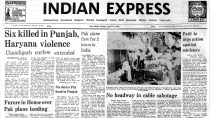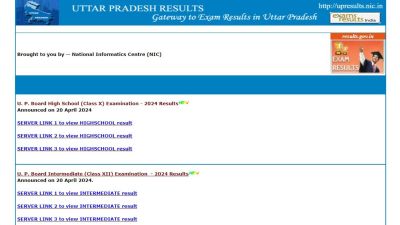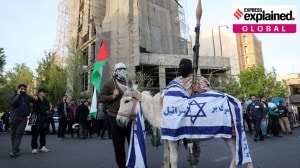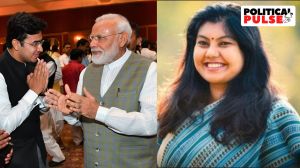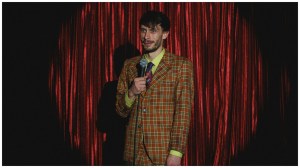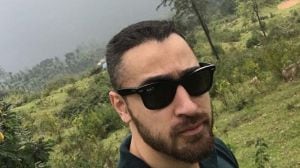- India
- International
Group of covid patients in Delhi transcend climate of hatred, hostility
A group of coronavirus patients from diverse backgrounds comes together in a hospital ward in Delhi to help heal each other.
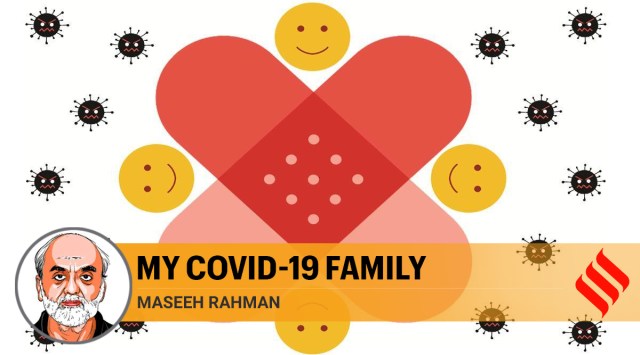 As journalists, we tend to sometimes adopt a general theory about India, especially in challenging times. (Illustration by C R Sasikumar)
As journalists, we tend to sometimes adopt a general theory about India, especially in challenging times. (Illustration by C R Sasikumar)After 10 days of treatment at home for COVID-19, I was rushed one evening to a private hospital in Delhi in a hypoxic state. The oxygen in my blood was falling and I was barely aware of my surroundings. I was immediately put on an oxygen concentrator, and started getting various antibiotics intravenously.
Getting admission in a hospital at the height of the pandemic in September wasn’t easy. I was assigned to a general ward, called an “economy room”, with five patients to a small room that had a common washroom. The other four patients in my ward were also admitted the same day.
As I lay in bed in a small, curtained cubicle, connected to various tubes, anxious and a little delirious, I recall my first thoughts — there was something warm and reassuring, I told myself, about the voice of the patient in the next cubicle (he was speaking on the phone). I didn’t realise then that I had opened a small door to what was eventually a rather profound experience.
The moment of epiphany came at 3 am on my fifth night in hospital. A woman walked into my cubicle and declared, “You’re shifting to the third floor! Pack your things.” Though both the medical treatment and the hospital care I was getting in the ward was good, there had been a mishap the night before — the antibiotics being administered to me intravenously had twice gone into the bed mattress, instead of my vein. My family had, therefore, organised a single room for me the moment it fell vacant, expecting better care on a more exclusive floor.
But I instinctively felt I should not leave the general ward. Being more ill than the other patients in the ward, I had barely related to them. But I had been hazily aware of their interactions, supporting, encouraging and advising each other. Total strangers, they had in a few days come together and created a community of the convalescent. It would be a mistake to leave such a supportive group and lie alone in a large single room, I felt, especially when relatives, friends and even senior doctors could not visit COVID-19 patients. I refused to go.

Along with me my neighbour — a prosperous costume jewellery trader from Delhi’s Sadar Bazaar — was also offered an upgrade. He packed his things and left. Within 10 minutes, he was back. “I feel better here,” he said matter-of-factly.
I got both the treatments which are now the subject of controversy — the drug Remdesivir and blood plasma therapy — besides a plethora of antibiotics. I felt the three shots of blood plasma helped. On the seventh day, it seemed like I had turned a corner. I began relating to the other patients.
The very first encounter in the passage was uplifting. “You look just like my Nana (grandfather),” a young mother with unflagging spirit cheerily told me. “It’s so good to see you up and about and smiling.” She had to leave her eight-month-old baby at home after contracting COVID-19.
As often with Indians, it didn’t take us long to become aware of each other’s origins.
Unsurprisingly, they were quite disparate — Punjabi Hindu refugees from Sargodha in Pakistan; Marwaris from Jhunjhunu in Rajasthan who had migrated to Gorakhpur in eastern UP; also from UP, the upper-caste Jaiswals, known historicially as much for their religious tolerance as for their skill at trading in liquor; and middle-class Sunni Muslim from Hyderabad.
But far from creating anxiety or hostility, awareness of each other’s backgrounds seemed to help us better understand each other. What was crucial, though, was the empathy, concern and caring we shared. We were in Delhi’s best private hospital, but I felt the healing process was greatly assisted by the sense of community we created.
Lying in bed, with the window framing tall eucalyptus and ashoka trees, and a tranquil moon at nights, I couldn’t help recalling how very different my experience had been just a few months earlier.
Delhi had been swept by a campaign of hate and intolerance. Violence had not yet exploded in the city’s north-east, but the air was full of anti-Muslim invective. I was invited to the residence of a European ambassador, along with others from the capital’s cultural and media world. It was amidst these elegant diplomatic surroundings that I first directly and dramatically experienced the radical transformation taking place in our society. A guest I had met barely a half-hour ago walked up to me at the buffet table. He seemed to be seething with rage. He pointed a finger at me, and apropos of nothing, began screaming, “I hate Muslims, I hate Muslims…. I especially hate rich Muslims.”
In all seriousness, he then began insisting that we go out to the ambassador’s garden and engage in a fistfight — it was as if his uncontrollable rage needed immediate physical redemption. I will not forget the look of utter disbelief on the face of a fashion designer from the Northeast standing next to me.
This was not a solitary experience. Around the same time, a good friend had turned overnight into an ardent fan of a nasty and divisive leader. Our conversations had soon acquired the quality of baiting.
I had then asked myself: Is the India of Swami Agnivesh and Rajmohan Gandhi and Sudha Bharadwaj, of decency and kindness and human empathy, disappearing so fast? It was both depressing and scary.
But then I was admitted to the hospital. And it became a transformative experience.
I was the last to leave my ward. Before they went home, both the costume jeweller and the young mother touched my feet and sought my blessings. The other two patients were a successful doctor from Gorakhpur and his wife. After I got home, the doctor phoned. “We were all worried the first few days. Your condition seemed bad,” he said. He invited me to visit Gorakhpur as his guest. “We’re like a family now.”
I have been a reporter all my life. As journalists, we tend to sometimes adopt a general theory about India, especially in challenging times. Which is that no matter how corrupt and extreme politics gets, the innate intelligence and goodness of “ordinary Indians” will re-establish the equilibrium. It happened, for instance, after the Emergency. But this time the forces of darkness are far more powerful and ruthless. For the sake of our people and our country, I am desperately hoping that we succeed in restoring the balance again. Twelve days in a hospital ward showed me that it’s possible.
This article first appeared in the print edition on October 28, 2020 under the title “My Covid-19 family”. The author is a journalist living in Delhi
EXPRESS OPINION
Must Read
More Explained
Apr 20: Latest News
- 01
- 02
- 03
- 04
- 05











